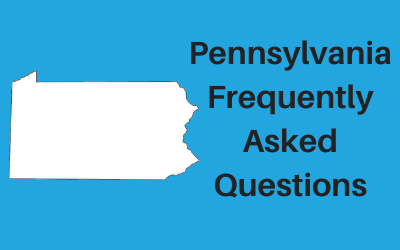Pennsylvania State Laws and Regulations
The information provided in this FAQ is intended to provide general information only and does not constitute legal counsel or advice. Members are encouraged to seek their own independent legal counsel to establish compliant policies, procedures, and programs.
Downloadable Resources:
You MUST be logged in as an NBHAP member in order to access these downloadable forms.
- Employee Confidentiality Agreement
- Employee Orientation Checklist
- Client Records Checklist
- Quality Assurance
- Initial Training Requirements
Overview
A list of overall rules and regulations for Pennsylvania. Click on the appropriate question to expand for more information.
What kind of facilities require a license?
What levels of care, facilities, and programs are available to clients in Pennsylvania?
What does it mean to be "licensed," "certified," or "accredited" in this industry?
Licensing & Certification
A list of rules and regulations for Pennsylvania specific to licensing & certification. Click on the appropriate question to expand for more information.
Which body authorizes and oversees substance abuse treatment facilities in Pennsylvania?
How does a facility obtain a license?
What are the different types of license which may be issued?
What kind of changes can affect a license once granted?
What can lead to the revocation of a license?
What kind of inspections might there be for licensure determination?
How can a facility prepare for inspections, on-site reviews, and audits?
Zoning & Land Use
A list of rules and regulations for Pennsylvania specific to zoning and land use. Click on the appropriate question to expand for more information.
What are the protections afforded to small group homes used for the purpose of residential substance abuse treatment?
Are there any proximity restrictions regulating how close treatment centers may be to each other? Can I open a residential treatment center right next to one that is already there?
What are the basic physical plant requirements for treatment facilities?
Care, Treatment, and Services
A list of rules and regulations for Pennsylvania specific to care, treatment, and services. Click on the appropriate question to expand for more information.
What client information should be collected during intake?
What information should be disclosed to the client during the admissions process?
What should we put in our admissions agreement?
How does a facility decide whether a client meets the criteria for placement in a particular level of care?
What services and staff must be offered at each different type of facility?
How does a program plan for a client's treatment?
What records must be kept for clients?
What rules govern the administration of client medications?
Which clients may be suitable for take-home privileges within narcotic treatment programs?
What rights are guaranteed to clients?
What kind of incidents must be reported?
What are grounds to dismiss a client from our program?
In what circumstances may a narcotic treatment program involuntarily terminate a client?
What type of paperwork should accompany a client discharge?
If a client has relapsed and needs to be discharged, is the program at risk if that client overdoses, and what protective steps should be taken?
How must clients' privacy be protected?
Payment and Marketing
A list of rules and regulations for Pennsylvania specific to payment and marketing. Click on the appropriate question to expand for more information.
How must I respond to clients who are unable to pay the required deductibles? Can I waive a program participant's financial responsibility?
What are the key issues insurers raise to demand recoupment of fees from substance abuse treatment programs?
What marketing practices are prohibited?
What are the limits of gift giving to potential referral sources?
What kind of benefits can I offer existing or new clients?
Recovery Houses
A list of rules and regulations for Pennsylvania specific to recovery houses. Click on the appropriate question to expand for more information.
What is a recovery house?
What kind of services can a recovery house offer?
Do we need a license to open a recovery house?
In the absence of current licensing, how can recovery houses demonstrate their commitment to meeting minimum quality standards?
What is the process through which a recovery residence can be certified by the Pennsylvania Alliance of Recovery Residences?
How does a recovery house apply for accreditation?
What are the legal protections for recovery houses?
Can local governments put special restrictions on recovery houses?
What other aspects must I consider before choosing a location for our recovery house?
What would our obligations to residents be?
What kind of agreement must we ask our residents to sign?
Can we insist on drug tests and searches?
Can a recovery house bill insurance for required and/or random drug testing?
Can we make residents' obligations contractually enforceable?
What kind of ownership and staffing structures are common with these types of residential arrangements?
Are there any other organizations from which we could find more information?
Reminder:
The information provided in this FAQ is intended to provide general information only and does not constitute legal counsel or advice. Members are encouraged to seek their own independent legal counsel to establish compliant policies, procedures, and programs.
Members must log in to see the full answer and download the forms.
Members log in to see the answer. Members Login | Join Today

A national membership association that provides education and advocacy for those in the behavioral health and addiction treatment industries.
We are the leading and unifying voice of addiction-focused treatment programs.




